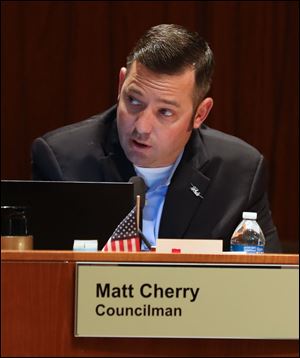
Toledo City Council should stick to land use
8/24/2018
Toledo City Council President Matt Cherry’s delayed vote on a permit for a solar array panel has drawn controversy.
We’ll have to take Toledo Council President Matt Cherry’s word for it that he delayed the vote on a zoning permit for a solar array panel because he was concerned the location might be in a flood zone.
Some suspected that Mr. Cherry, the city’s District 2 councilman and a business agent for Sheet Metal Workers Local 33, which is associated with the Northwest Ohio Building and Construction Trades Council, was using his power of setting council’s agenda to help smooth over a dispute between two unions.
Click here to view more Blade editorials
Unions representing electricians and carpenters are fighting for lucrative pieces of the union contract to construct the project. And for reasons he didn’t divulge at first, Mr. Cherry removed the ordinance approving a special use permit — while it was under a time constraint — from council’s meeting agenda.
Economic development depends on prompt and transparent action by government when something needs a zoning permit. In this case, a vote was needed from council to approve a special use permit for the proposed renewable energy project at Overland Industrial Park, 1000 Jeep Pkwy., the former location of the Jeep assembly plant.
Dana Inc.’s Toledo Driveline plant plans to buy energy from the solar field, and all revenue would then go to the Toledo Community Foundation to be distributed as grants in the neighboring communities.
The Toledo-Lucas County Port Authority, which runs the industrial park, requested the special-use permit, and council members have lauded the project’s value to the neighborhoods that surround the industrial area.
Council voted 11-0 on July 17 to expedite the permitting process for the project, and on Aug. 13 council’s zoning and planning committee agreed to recommend approval. That would have been the right time for a councilman to ask whether flooding would be a problem.
The mystery of why the item disappeared from the agenda the following day, Aug. 14, was resolved a couple days later when Mr. Cherry said his concern was that the site is in a flood zone. According to planning documents, the location has a 1 percent chance of annual hazardous flooding. The threat was addressed in writing by the Toledo-Lucas County Plan Commission and contained the condition that the state floodplain administrators office sign off on the site. In no way did a delay by council resolve the issue, and when it came up for a vote and passed 11-0 earlier this week, Mr. Cherry offered no comment on whether his concern about flooding was resolved.
Council’s only responsibility in this issue was to approve or disapprove of a zoning permit, which relates to land use, and has nothing to do with jurisdiction in a labor dispute. In the future, Mr. Cherry should take care to explain his agenda decisions so the public is assured that he is acting in the city’s best interests rather than those of his friends and allies.